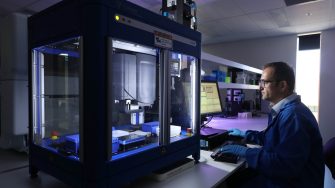
Since the genomics era, significant advances in modern science and genetic engineering have incited the DNA synthesis of micro-organisms and accelerated the ability to manufacture the likes of pharmaceuticals, fuels and foods from scratch.
Synthetic biology applies existing engineering principles to molecular biology by designing new biological systems and manipulating existing ones. Central to this approach is the deconstruction of these systems into biological components for reassembly into novel materials and devices for useful purposes. These standardised genetic pieces and devices include enzymes, proteins, DNA and genetic circuits.
As an exciting 21st century discipline, synthetic biology incites interdisciplinary collaboration with the potential to address real-world problems such as human health and renewable energy. UNSW Dr Dominic Glover’s research has harnessed computational methodologies to develop biomaterials by engineering individual proteins and synthetic genomes.
UNSW Scientia Fellow Dr Matthew Baker and his team are studying the evolutionary history and genetic code of ancient bacteria in order to engineer them in the present. This research has involved discovering the complex and flagellar motor, which bacteria use to swim.
UNSW Biotechnology & Biomedical Sciences run an annual competition, the International Genetically Engineered Machine (iGEM) team. This is a global synthetic biology competition where various genetic components are supplied and used to build biological systems.
Our entrepreneurial students recently designed a self-assembling scaffold system to co-localise enzymes in a modular dynamics system. Their methods included metabolic engineering, molecular analysis, cloning DNA and protein production to develop the successful project.







